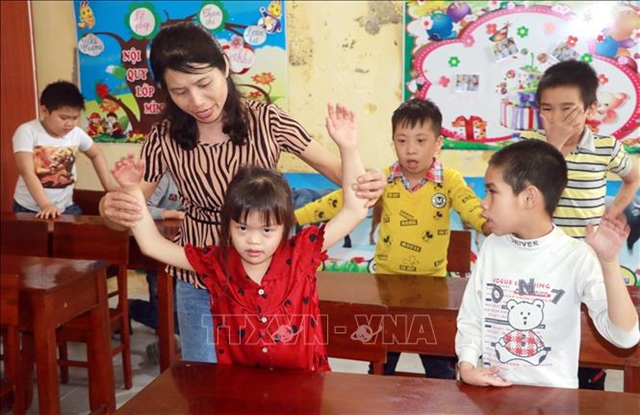 Society
Society

The School for Children with Disabilities in Giao Thủy District, Nam Định Province, has acted as a shelter for disabled children for the past 30 years.

|
| A teacher at the School for Children with Disabilities in Giao Thủy District helps students do exercise in class. — VNA/VNS Photo |
NAM ĐỊNH — The School for Children with Disabilities in Giao Thủy District, northern Nam Định Province, has acted as a shelter for disabled children for the past 30 years.
The school is the only one in the province to cater to disabled children.
Beside regular education, students suffering many different types of disabilities were taught life skills, provided with rehabilitation, and offered vocational training.
“They are equipped with skills to be confident, integrate into the community, thereby striving to thrive in life and looking for a suitable job,” said Nguyễn Thị Oanh, the school’s principal.
The school currently has 10 teachers and 125 students mainly from Nam Định Province, as well as some from neighbouring provinces.
The teachers have to take on many jobs at the same time, both teaching and giving the students physical training, life skills, as well as helping them in daily activities and during meals.
Nguyễn Thị Kiều Diễm, one of the teachers, has to work very hard even though her class has just 10 students.
She had to help each child to follow the lesson, because it was easy for them to lose focus.
"Sometimes in class, the children talk and do not pay attention to the lesson,” she said.
“I have to stop the lesson, then walk around and correct each child's posture, telling them how to open their mouths to pronounce each word.”
The lessons are short, but sometimes it takes an entire day or more to complete it.
Students, when first entering school, have different cognitive levels and health conditions, so teachers have to look for a suitable teaching method for all students in a class, Diễm said.
“Teachers must understand the health of each student, in order to plan accordingly. We must have love for children, patience and encouragement for students, helping them to boldly develop their own abilities.”
Bùi Thị Minh Hương, who has spent 30 years at the school, said: “The teacher is really like a mother, a friend, they must understand the cognitive and physiological abilities of each child.”
As the teachers can adjust their methods and the content of the lesson, the lessons can be subdivided and adjusted.
To save money, teachers often take advantage of old appliances as tools to help children with difficulties in mobility.
Most of the students live at the school, so three rooms are equipped with air conditioning, television and fans.
Three members of staff also stay with the students to ensure that they were studying and living safely.
As a deaf student attending 4th grade at the school, Đỗ Thị Ngọc Mai, 17, can speak slowly or use sign language to communicate with people.
“I am very happy to be taught knowledge and sewing skills here,” she said.
“I hope that after graduating from school I can find a job in a local business to make money, help my parents, especially take care of myself.”
Nguyễn Thị Oanh, the school’s principal, said Giao Thủy District People's Committee has provided facilities for the school.
Some children with autism, after a year or two of studying at the school, can integrate and study in normal primary schools, according to Oanh.
After leaving the school, some students can follow higher levels of education and many can get jobs in factories.
In recent years, the number of students wishing to attend the school has increased. The school has called on donors to help upgrade facilities and asked local enterprises to give students jobs. —VNS